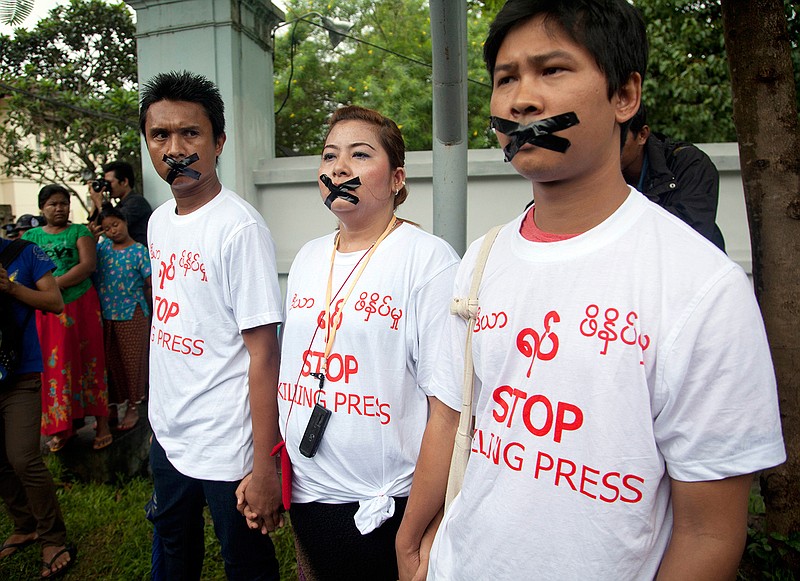BANGKOK-When five Myanmar journalists were sentenced to decade-long prison terms for reporting the alleged existence of a military-run chemical weapons factory in Myanmar a few years ago, Aung San Suu Kyi-then an opposition lawmaker-condemned the harsh punishments as "very excessive."
The journalists, from the now-defunct Unity publication, had been convicted for violating the nation's Official Secrets Act-the same colonial-era law now being leveled against a pair of Reuters reporters who are facing a staggering 14 years behind bars each.
"It's not that I don't accept a concern over national security," Suu Kyi told supporters during a July 2014 rally, according to an article published at the time in the Irrawaddy, a local media outlet. "But in a democratic system, security should be in balance with freedom."
When "the rights of journalists (to report) are being controlled," Suu Kyi said, the very notion of democratic reform in Myanmar is "questionable."
Three and a half years on, the thinking of Suu Kyi, who now heads the government, has apparently changed dramatically. Rather than champion the press, she has presided over an administration whose courts have aggressively pursued legal charges against dozens of journalists, along with other attempts to suppress and discredit the media.
Police arrested Reuters reporters Wa Lone and Kyaw Soe Oo on Dec. 12 while they were investigating the massacre of 10 ethnic Rohingya Muslims in the village of Inn Din by the Myanmar military and Buddhist villagers. The Reuters story included photos provided by a Buddhist village elder of the 10 captives lined up in a row, kneeling, and later of their bloodied bodies in a shallow grave. The reporters further supported their account with testimony from Buddhist villagers who confessed to burying bodies and killing Muslims, and also from security personnel and the paramilitary police themselves.
But when former U.N. ambassador Bill Richardson met Nobel Peace prize laureate Suu Kyi this month and brought up the case against the Reuters reporters, it "brought almost an explosion on her part," Richardson said.
Suu Kyi's spokesman, Zaw Htay, has said that Richardson exceeded his mandate by bringing up the issue. Richardson had been invited to the country to participate in an advisory panel on the Rohingya crisis; he withdrew, calling it a "whitewash."
Reporters and human rights groups covering the crisis have documented grave atrocities, including mass rape, several massacres and widespread arson attacks that left hundreds of Rohingya villages burned to the ground. Earlier this month, The Associated Press reported the existence of at least five mass graves at Gu Dar Pyin village in Rakhine state.
Suu Kyi's government has routinely denied atrocities and staunchly defended the military's actions, portraying critical media reports as "fake news" in what analysts say is an effort to discredit independent media reports and limit reporting.
They're "doing everything in their power to block the flow of news, to ensure that no damaging information comes to light," said Shawn Crispin, Southeast Asia representative for the New York-based Committee to Protect Journalists.
"They're using legal threats, they're blocking access to areas where alleged abuses occurred, they're making it harder for foreigners to get visas," he said. "They've created a climate of fear among local reporters, too, and the message is clear. If you report critically, you risk going to jail."
As the antagonism against foreign media has grown, some agencies pulled reporters from the country. AP correspondent Esther Htusan left Myanmar in late November after threats were made against her life on social media and unidentified men followed her to her Yangon home.
Not so long ago, the mood in the Southeast Asian nation was very different. When the military, which ruled for half a century, ceded some power to a nominally civilian government in 2011 amid what was widely lauded as a long-awaited transition to democracy, journalists were bursting with optimism. The government abolished censorship in 2012, allowing local media outlets to flourish for the first time in decades. Foreign correspondents were granted visas, enabling them to report on what had been one of the most closed nations in the world.
The Associated Press was among those allowed in. The news cooperative maintained a presence in Myanmar and covered the nation for decades through local correspondents.
Associated Press reporter Esther Htusan contributed to this report.

